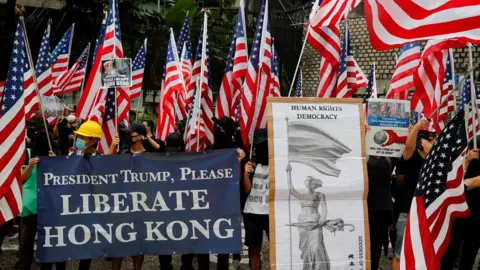Hong Kong protesters appeal to Trump for help
Pro-democracy protesters in Hong Kong are appealing to President Donald Trump for help as they march near the US consulate general in the city.
Some are carrying banners reading, "President Trump, please save Hong Kong" and "Make Hong Kong great again".
The protests, now in their 14th straight week, have continued despite Hong Kong's leadership finally meeting one of the protesters' key demands.
China has consistently warned other countries not to interfere.
It says the situation in Hong Kong, a former British colony handed back to China in 1997, is purely its own internal affair.
Sunday's crowd waved US flags and chanted pleas for the US to "liberate" Hong Kong from China.
They are asking the US to pass a proposed "Hong Kong Human Rights and Democracy Act", which Democratic Senators are pushing for consideration next week.
The law would require the US to certify Hong Kong's high degree of autonomy on an annual basis to justify its special trade status.
It could also expose Chinese officials to US sanctions if they were found responsible for suppressing Hong Kong's freedoms.
Protesters sang the US national anthem, The Star-Spangled Banner, and a new rallying cry of "five demands, not one less" - after one of their long-standing conditions for ending demonstrations was met earlier this week.
 Reuters
ReutersWhat do protesters want?
The protests first erupted over a controversial extradition law which would have allowed Hong Kongers to be extradited to mainland China - where a different legal system applies.
Mass protests involving hundreds of thousands of people demanded that the plan be abandoned. It was initially suspended in June, and then finally dropped earlier this week.
In the meantime, the protesters' demands had spiralled into calls for a much wider set of reforms.
Four of their demands remain unmet:
- Withdrawal of the "riot" description used about the protests by the authorities
- Amnesty for all arrested protesters
- An independent inquiry into alleged police brutality
- Universal suffrage for the elections of the chief executive and Legislative Council, Hong Kong's parliament
Some also want Hong Kong's embattled political leader, Carrie Lam, to resign, accusing her of being controlled by the mainland government in Beijing.
But the protests have sometimes turned violent.
On Saturday, some protesters attempted to gain access to the international airport, the site of previous demonstrations. But police only allowed airline passengers with a ticket to board trains and buses bound for the terminal.
By Saturday night, the situation had destabilised into running clashes between protesters and police, with tear gas being fired in the city - a common sight during the weeks of demonstrations.
Is the US likely to get involved?
The appeal for US intervention comes despite President Donald Trump's characterisation of Chinese leader Xi Jinping as "a great leader who very much has the respect of his people".
"I have zero doubt that if President Xi wants to quickly and humanely solve the Hong Kong problem, he can do it," Mr Trump tweeted in mid-August.
On Saturday, US Secretary of Defense Mark Esper said China should show "restraint".
Instead of a crackdown, he urged Chinese authorities to "to sit down and talk with the protesters and resolve the differences."
For its part, China has not only warned foreign powers not to interfere, but has outright accused the US and Britain of encouraging the protests.
The US State Department has issued a travel advisory for Americans visiting Hong Kong, warning that US citizens and diplomatic staff "have been subject to a People's Republic of China propaganda campaign falsely accusing the United States of fomenting unrest in Hong Kong."
